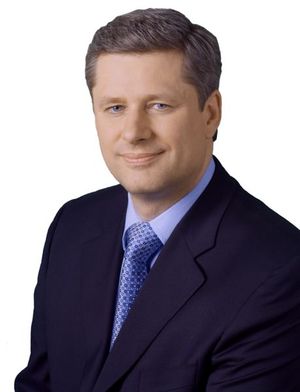Stephen Harper
Stephen Harper is currently the 22nd Prime Minister of Canada and leader of the Conservative Party of Canada.
History
Stephen Harper was born on April 30, 1959 in Toronto, Ontario. He received a Master's degree in economics from the University of Calgary.
As a young man, Harper briefly worked as an intern in Ottawa as an assistant to the Progressive Conservative Party of Canada. However he eventually grew frustrated and disillusioned with the party, which he saw as overly pragmatic, insufficently conservative, and hostile towards the interests of western Canada.
Returning to Alberta, he joined forces with conservative activist Preston Manning and helped found the Reform Party of Canada, a "true" conservative party designed to challenge the dominance of the Progressive Conservatives and then-PC Prime Minister Brian Mulroney.
Harper proceded to be elected to Parliament in 1993 as a Reform Party of Canada member to represent the riding of Calgary West. In 1997 he declined to run for re-election, however, becoming frustrated with parlimentary politics and Manning's leadership of the Reform Party.
Subsequently, he became the head of the National Citizens Coalition (NCC), a conservative advocacy group in Canada.
Recent history
When Manning resigned as leader of Reform in 2000 the party renamed itself the Canadian Alliance and was briefly led by Stockwell Day. Day was an unpopular leader, though the party did make some parliamentary gains during his leadership. When he stepped down in 2002 Harper re-entered politics to replace him, and was subsequently elected the new leader of the Canadian Alliance (CA).
As leader, Harper was instrumental in instigating a merger between the CA and his old rivals, the Progressive Conservative Party, which was now led by Peter MacKay, a man who was open to the idea of joining forces to help "unite the right" in Canada, and create a party powerful enough to defeat the entrenched Liberal Party of Canada. Harper's eagerness to merge led him to compromise several key principles of the Canadian Alliance, however. In order to win the moderate MacKay's support, Harper "softened" many of the CA's positions on issues.
Once the deal was inked, Harper was then elected first leader of the new Conservative Party of Canada.
Prime Minister
In an election in 2006, the Conservative Party of Canada elected enough members of parliament to unseat Liberal Prime Minister Paul Martin and form a minority government. Stephen Harper became the Prime Minister on February 6th, 2006.
Harper's Conservative Government has largely followed his election platform of five key priorities. They are :
- Federal Accountability
- Tax Reform (including dropping the Canadian VAT, the GST from 7% to 5%
- Crime
- Child Care
- Health Care
In addition Harper has focused his energy on rebuilding the Canadian Forces and the war in Afghanistan.
In 2007 Harper promised Canadian farmers over $1 billion Canadian dollars in farm subsidies but at the same time promising to end the Wheat Board of Canada's sales monopoly in Western Canada[1], (a government group that manipulates the prices of wheat and barley). Some farmers believe this would cost the Canadian farming industry billions of dollars in lost revenues while others feel the industry would benefit by allowing farmers in the West to market and sell their produce as they see fit; just as farmers in the east are allowed to do. The United States also wants the Wheat Board of Canada removed from power because it claims price fixing is unfair to free-trade. Wheat exports to the United States account for only 10% of Canada's wheat production.
Views
Mr. Harper is a member of the Christian and Missionary Alliance, a conservative evangelical Christian group, and is generally considered to have socially conservative views on most issues. He opposes gay marriage and abortion and supports capital punishment. During the 2003 Iraq War his party was the only one in Canada that supported the United States and George W. Bush. In his past careers he has also been strongly critical of taxation, multiculturalism, constitutional concessions to Quebec, and socialized healthcare.
As Prime Minister, however, Harper has governed much more pragmatically. Canadian liberals often accuse Harper of being "right wing" and too similar to George W. Bush and American Republicans; analogies which are used to inflame anti-American sentiment in Canada. In the 2006 election Harper thus sought to distance himself from some of his strongly conservative positions of the past, usually by vowing to not pursue a radical social agenda while in office, but instead focus on certain economic prorities.
Regardless, as a minority Prime Minister whose caucus is still outnumbered by left-wing parties, Harper's ability to govern as a true conservative has been somewhat limited. He has, however, introduced reforms limiting Canadian gun control laws and may be able to implement a more conservative set of policies if his party wins re-election with a majority of the seats in the Canadian parliament.
